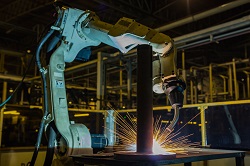Turnkey robot automation for SMEs
Robot automation may stand to reason when you’re running a high-throughput assembly line, but the business rationale is not so straightforward for SMEs. One problem lies in installation time and cost, high enough to make it an instant no-go, but there is more. “SMEs typically have shorter batches, smaller production series, and more process variation. These things are difficult for the old-fashioned robots, which are typically good at highly repetitive tasks in very structured environments for very long periods of time,” explains Prof. Martijn Wisse, researcher specializing in industrial robot intelligence at TU Delft. Should an SME decide to go ahead anyway, the required development time for developing task-specific software (such as vision software) and hardware (such as grippers) is so long and the cost so high that the added value would be almost inexistent. It doesn’t necessarily mean that robot automation is out of the question. Or at least, not since Prof. Wisse’s FACTORY-IN-A-DAY project successfully developed a technology capable of changing the playing field. With its “plug and work” solution, the project proposes a robot that can be installed, customised and programmed for defined tasks within a few days. It’s a turnkey package that encompasses tools – notably VR-based – to speed up discussion with customers; 3D-printed application-specific components; a software for self-calibration; an artificial skin that allows the robot to learn from human operators manually guiding it thanks to a teaching demonstration algorithm; a collision avoidance system; and other innovative features. “The main difficulty lied in connecting all of the embarked software packages together, such as motion control, motion planning, reflexive motions for contact evasion, learning from interaction with users, 2D vision, 3D vision, etc. This is why we decided to adhere to the communication standards and protocols of ROS – the most successful open-source robotics middleware on the market,” Prof. Wisse explains. The FACTORY-IN-A-DAY robots are collaborative, meaning that they can work safely in a human working environment. This results in much less development time, as neither large factory floor re-arrangements nor obtrusive large safety fences have to be designed. To try it is to love it All this hard work resulted in the project team winning the 2016 edition of the Amazon Picking Challenge, which allowed them to showcase the intelligent product handling capabilities of their robot systems. The project also largely contributed to advancing the ROS-Industrial software, which is already driving hundreds of industrial robots in factories all over the world. Prof. Wisse says that SMEs are highly interested in the system, with some even already having a robot system implemented. But reduction of installation time remains an issue, as he explains: “Most SMEs are waiting until robots can be deployed in their factory as easily as a new PC in their office.” The project team have already made great strides toward that goal, but Prof. Wisse admits that there is still room for improvement. He would also like the future versions of the robots to be even more intelligent and more capable to flexibly deal with variations in their environment. FACTORY-IN-A-DAY was completed in September 2017, and a follow-up project called ROSIN is already ongoing. “The new project fully focuses on improving the availability and reliability of open-source software components that can make the robots even smarter. European companies can request funding from us if they are interested in developing their own contributions to ROS-Industrial,” Prof. Wisse concludes.
Keywords
FACTORY-IN-A-DAY, SME, automation, robot, artificial skin, ROS, robotics







